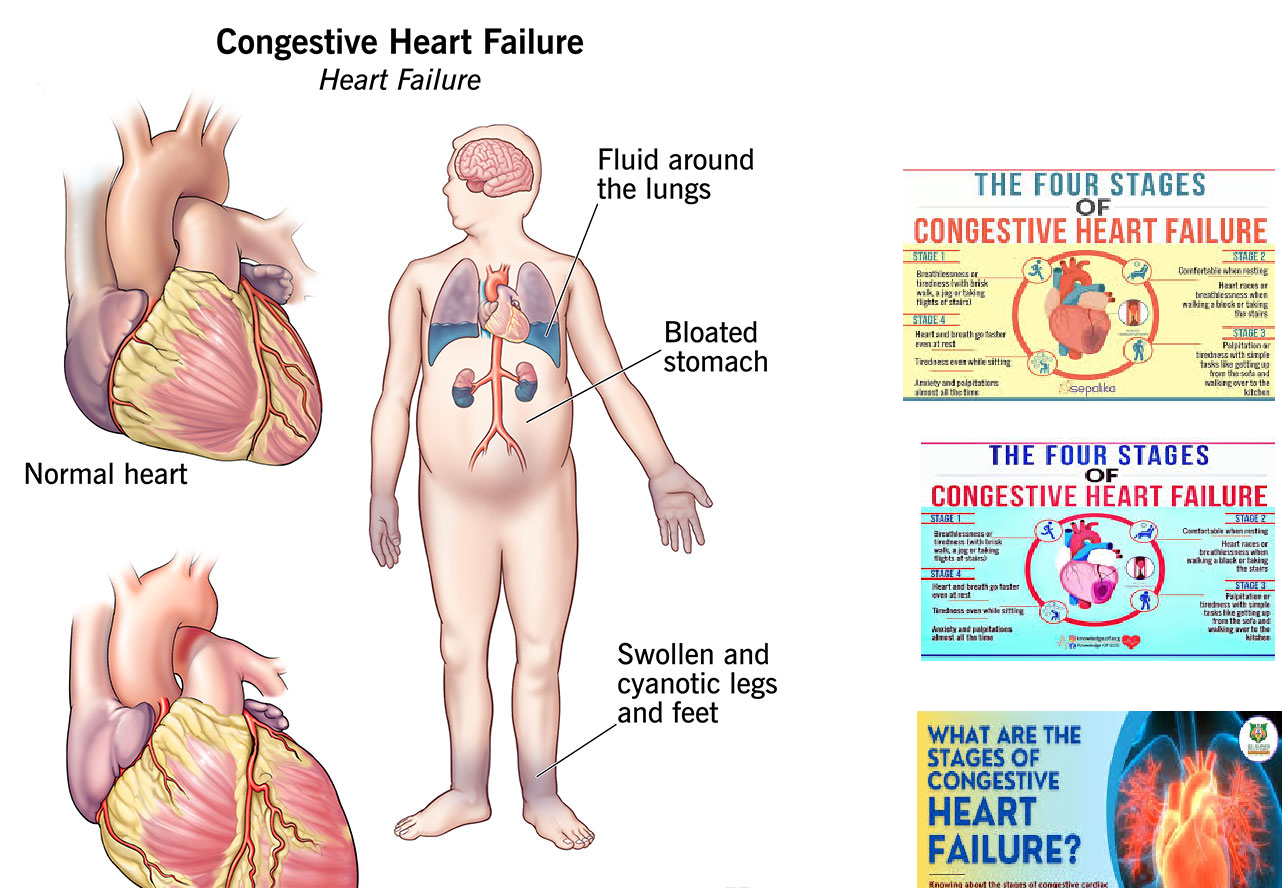Congestive heart failure (CHF) is a chronic condition where the heart struggles to pump blood effectively, leading to fluid buildup in the body. Life expectancy for someone with CHF varies greatly depending on the individual’s age, health, stage of heart failure, and treatment approach. On average, the 5-year survival rate is around 50%, but it decreases with advancing age and the severity of the disease.
Life Expectancy by Age Group
- Under 65 years old: Younger patients with heart failure typically have a better prognosis due to their ability to respond more effectively to treatment. On average, 5-year survival rates for this group are higher, ranging from 60-70%.
- 65-75 years old: As age increases, so do complications. The 5-year survival rate for this group tends to be closer to 50%.
- Above 75 years old: For elderly patients, heart failure can lead to significantly reduced life expectancy, with survival rates often below 30%.
What Are the 4 Stages of Congestive Heart Failure?
The progression of congestive heart failure is categorized into four stages:
- Stage A: High risk of developing heart failure, but no symptoms. People with hypertension, diabetes, or family history of heart disease fall into this stage.
- Stage B: Structural heart disease (e.g., past heart attack) but no current symptoms of heart failure. The focus is on preventive treatment.
- Stage C: Structural heart disease with current or past symptoms like fatigue, shortness of breath, or swelling. Treatment here is more intensive, including lifestyle changes and medication.
- Stage D: Advanced heart failure with persistent symptoms despite treatments. This stage may require specialized interventions such as heart transplants or mechanical support devices.
How Can I Prevent Congestive Heart Failure?
Preventing CHF involves managing risk factors that weaken the heart. Key preventive measures include:
- Controlling high blood pressure and cholesterol levels.
- Maintaining a healthy weight through diet and exercise.
- Avoiding smoking and limiting alcohol intake.
- Managing diabetes and other conditions affecting the heart.
- Staying physically active to strengthen heart function.
Can Heart Failure Go Back to Normal?
Heart failure is usually a progressive condition, but with early detection and aggressive treatment, it’s possible to improve symptoms and slow the disease’s progression. While the heart may not return to “normal,” many patients can live longer, fuller lives with proper management.
What Are the Medical Treatments for Congestive Heart Failure?
The medical treatments for CHF aim to manage symptoms, slow progression, and improve quality of life. They include:
- ACE inhibitors to relax blood vessels and reduce the heart’s workload.
- Beta-blockers to lower heart rate and reduce blood pressure.
- Diuretics to help eliminate excess fluid and reduce swelling.
- Aldosterone antagonists to balance electrolytes and decrease fluid buildup.
- Implantable devices like pacemakers or defibrillators may be used in advanced cases.
Which Food is Good for the Heart?
Heart-healthy foods include:
- Leafy greens like spinach and kale.
- Whole grains such as oats and brown rice.
- Berries rich in antioxidants.
- Fatty fish like salmon, loaded with omega-3 fatty acids.
- Nuts and seeds, which provide healthy fats.
- Legumes and beans for fiber and protein.
How to Increase Heart Strength?
To strengthen your heart, you can:
- Exercise regularly, focusing on aerobic activities such as walking, swimming, or cycling.
- Eat a heart-healthy diet, low in saturated fats and sodium.
- Manage stress through techniques like yoga, meditation, or deep breathing.
- Avoid smoking and excessive alcohol consumption.
What is the Latest Treatment for Congestive Heart Failure?
Recent advances in CHF treatment include:
- SGLT2 inhibitors, a class of medications originally used to treat diabetes, have shown promise in improving heart function.
- Gene therapy and stem cell therapy are being researched as potential treatments to regenerate damaged heart tissue.
What is the First Line Treatment for Congestive Heart Failure?
The first line of treatment often includes ACE inhibitors or ARBs to lower blood pressure and prevent further damage to the heart. Beta-blockers are also commonly prescribed as part of the initial treatment plan.
Which is Best in Treatment of Heart Failure?
The most effective treatment depends on the stage of heart failure and individual factors. A combination of ACE inhibitors, beta-blockers, and diuretics often forms the core treatment for CHF patients. Device implantation and surgical options may also be necessary for advanced cases.
What is the Miracle Drug for Heart Failure?
While no drug can cure heart failure, Entresto (a combination of sacubitril and valsartan) has been termed a “miracle drug” by some due to its ability to reduce the risk of hospitalization and improve survival rates in heart failure patients.
What is the Recovery Time for Congestive Heart Failure?
Recovery times vary based on the severity and stage of the disease. Many patients can return to daily activities within a few weeks after an acute episode, though managing CHF requires lifelong monitoring and care.
Which Are Two Signs of Worsening Heart Failure?
Key signs of worsening heart failure include:
- Shortness of breath that worsens or occurs during rest.
- Swelling in the legs, ankles, or abdomen that increases over time.
Managing CHF requires ongoing care, but with the right treatments and lifestyle changes, many individuals can improve their quality of life and extend their longevity.
Read more:
1= https://rapidurlindexer.net/blogs/what-are-the-worst-perimenopause-symptoms/
3= https://rapidurlindexer.net/blogs/what-are-5-common-symptoms-of-kidney-stones/



